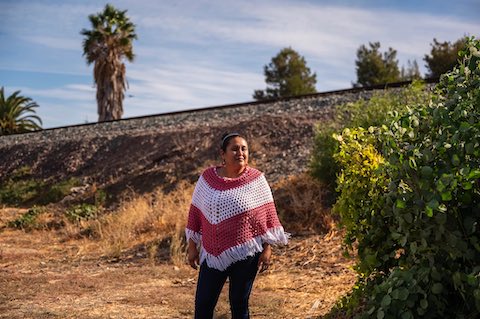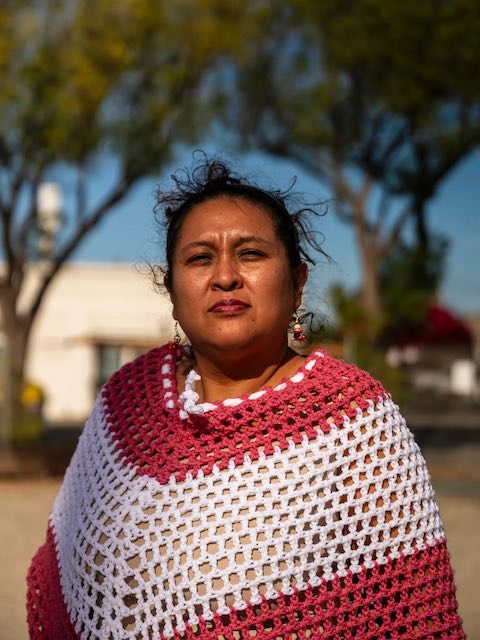
30 Oct Is California’s Proposed Minimum Wage Hike a Path to a Living Wage or Just a Band-Aid?

Isabel Morales earns $20 per hour, but like many Bay Area Latinos, she still can’t make ends meet.
Story by Erica Hellerstein, El Tímpano | Photos: Hiram Alejandro Durán for El Tímpano/CatchLight Local/Report for America corps member
At the end of each month, like clockwork, Mery Gutierrez braces herself. That’s when the bills arrive, and lately, the 68-year-old is never sure if her income will stretch far enough to cover everything she owes: rent, phone, garbage and electricity.
“When the end of the month comes, we’re scared,” said Gutierrez, who lives with her 71-year-old husband in Concord. “We don’t have enough for rent; we don’t have enough for electricity.” When money is especially tight, they cut back on food: “Just rice and eggs, and that’s what we eat, because sometimes we don’t have enough,” she said. “Sometimes, we have to give things up.”
Gutierrez earns $18 per hour caring for an elderly woman in Concord. If voters approve a ballot measure on Nov. 5 to raise the state’s minimum wage to $18 an hour, that figure will become California’s base pay. If passed, Proposition 32 would increase wages for an estimated 2 million workers in California, establishing the nation’s highest minimum wage. Some Bay Area cities, including Berkeley, Oakland, Emeryville and Richmond, have already passed higher minimum wages, but Concord’s $16 hourly wage matches the state’s.
Gutierrez already makes $2 more than Concord’s minimum. But even then, she said, it’s not enough. “Everything is too much. The garbage, the electricity, the water,” she said. Rent alone consumes more than half of her monthly income, and while she picks up extra work cleaning houses, she said she’s left with almost no financial cushion. “Everything has gotten more expensive,” she said. “I can’t make ends meet anymore.”
Gutierrez’s challenges underscore the strain California’s sky-high cost of living places on low-wage workers across the state, who are struggling to keep up with runaway food, gas and rent prices. Her difficulties getting by on what could soon be the highest minimum wage in the country also highlight the gap between the minimum wage and what experts call a living wage—the amount needed to support an individual or family.
In Contra Costa County, where Gutierrez lives, a two-adult, two-child household with both parents working full-time would need to earn more than twice California’s proposed minimum wage to meet the living wage threshold, according to the Massachusetts Institute of Technology’s living wage calculator. Researchers estimate such a family spends on average $31,282 annually for housing, $35,482 for child care and $14,734 for food. To meet their needs, parents must make $37.68 per hour, far above the state’s $16 salary floor.
“Simply having a job in California does not guarantee economic security,” said Alissa Anderson, a senior policy fellow with the California Budget & Policy Center. Anderson noted that most California families living in poverty are working families. “Many low-paid workers won’t benefit from Prop 32 because they’re already paid above the state minimum wage. And oftentimes that’s still not enough to be able to afford housing, food and other major costs.”
While passing Proposition 32 could alleviate some financial pressure on low-income Californians, Anderson said raising the minimum wage alone won’t solve the state’s soaring poverty rates. “The state clearly needs a holistic approach to cutting poverty,” she explained, pointing to policies that increase access to affordable housing and child care, reduce health care costs and strengthen safety-net programs.
“There really needs to be a comprehensive approach,” Anderson added. “This isn’t going to be fixed just through increasing pay. It’s about a lot of different policy issues.”
Latinos disproportionately affected by California’s cost of living crisis
California’s rising costs have hit Latinos especially hard, as they face both higher poverty rates and overrepresentation in low-wage work. According to UC Berkeley’s Labor Center, Latinos make up the majority of workers in California classified as low-wage, earning less than $19 per hour. More than half of all Latino workers in the state are paid low wages.
At the same time, the expiration of federal pandemic-era programs has driven the poverty rate among Latinos sharply upward. In 2023, the poverty rate for Latinos in California was 25%, up from 12% in 2021, according to data from the U.S. Census Bureau analyzed by the California Budget & Policy Center. For Latinos living in the Bay Area, the region’s notoriously expensive housing market adds even more financial strain. Research by United Ways of California shows that 49% of Latino households in the Bay Area are not earning enough to make ends meet.
On Sept. 16, El Tímpano asked SMS subscribers, most of whom are Spanish-speaking immigrants in the East Bay, how much they earned per hour, and how Proposition 32 might affect them and their families. We heard back from 95 people, many of whom said the proposed $18 wage would not be enough to cover rising costs for food, child care and housing. Some earn more than minimum wage and said they still struggle to make it to the end of the month.
“Eighteen is nothing,” a respondent in Hayward replied. “Only teenagers with their first jobs would accept that salary. A family of two and a child needs at least $30 an hour to survive.”
The responses from our SMS community align with what Caheri Gutierrez, communications director at the Fruitvale-based nonprofit the Unity Council, hears from Oakland residents earning the city’s $16.50 minimum wage, yet still barely scraping by. Gutierrez explained that Fruitvale, “the land of the essential worker,” was hit especially hard by COVID-19, recording some of the highest coronavirus rates in Alameda County. “While many Oakland residents could stay home during the pandemic, our community members were risking their lives to mobilize the economy,” said Gutierrez. Fruitvale’s largely Latino immigrant community has struggled to recover from the pandemic’s fallout, inflation, and rising property crime, which has targeted local businesses.
“People are still struggling with the minimum wage,” Gutierrez said, wondering if the conversation should shift from minimum wage to “what is the actual sustainable living wage for people to thrive?”
Not everyone is convinced about raising the minimum wage. Gutierrez said the Unity Council has also heard concerns from small-business owners worried about the proposition leading to increased labor costs, which could force them to scale back or even shut down.
The measure’s supporters and opponents disagree about the likelihood of this outcome.
Boosting the state’s minimum wage, supporters say, would provide a crucial economic lifeline to millions of Californians by putting an extra $3,000 annually in the pockets of full-time workers. They claim there’s no evidence of job loss following wage increases and that price hikes are minimal. They point to a recent UC Berkeley Labor Center study on California’s newly approved $20 minimum wage for fast food workers, which found the pay boost did not result in job cuts for workers, while food prices increased by 3.7% after the law went into effect. They also highlight previous research that found California’s increase to a $15 minimum wage had no measurable effect on job losses.
Opponents, however, say that raising the minimum wage would lead to job cuts, reduced hours for workers, higher prices for consumers, and a negative impact on small businesses. They cite research from Beacon Economics linking minimum wage increases to youth unemployment, as well as a survey of small businesses commissioned by West Hollywood in which 42% of 142 small businesses reported laying off workers or reducing staff hours after the city passed a $19.08 minimum wage.
- Isabel Morales, a single mother of two, earns $20 an hour working part-time as a health promoter while also cleaning houses on the side. Her biggest expenses – rent, utilities, and gas – eat up nearly everything she brings home. “I never have enough,” she said.
For Isabel Morales, the minimum wage is about more than dueling economic studies. The 49-year-old Morales, who lives in Pittsburg, works as a health promoter with a handful of East Bay nonprofits that support low-income and immigrant families. In that role, she routinely hears about the trade-offs people make just to get by – working two to three jobs to make rent, single parents choosing between child care and an extra shift, full-time workers struggling to stretch their paychecks to the end of the month. Lately, Morales said she has heard from more and more people about losing work or having their hours cut in their hours cut in industries like construction and landscaping.
Morales, a single mother of two, feels this struggle firsthand. She earns $20 an hour working part-time as a health promoter while also cleaning houses on the side. At the end of the month, she said, settling her bills is always a delicate balance. Her biggest expenses – rent, utilities, and gas – eat up nearly everything she brings home.
“I never have enough,” she said in Spanish. In October, she worried about making rent with other bills piling up. Keeping faith that things will work out even when the finances are tight “is very difficult,” she said. But she’s holding on for now. “The key is not to give up, to speak up, to advocate for each other. If these needs never come to light, we will never know how to solve them.”
This story was originally published Oct. 25 by El Tímpano. It is has been republished here upon request.




No Comments